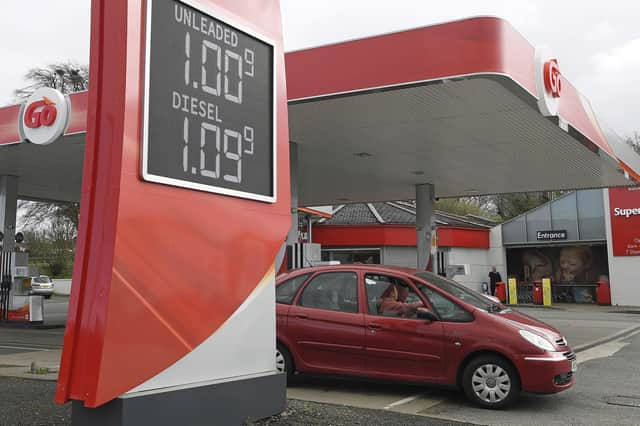Petrol stations 'facing closure' as fuel prices plummet


The Petrol Retailers Association (PRA) said sites in rural areas where fuel use had collapsed the most were particularly vulnerable.
The warning comes as fuel prices had their biggest weekly fall since currency records began.
Advertisement
Hide AdAdvertisement
Hide AdGovernment data revealed the average cost of a litre of petrol was £1.12 on Monday, compared with £1.20 seven days earlier.
Diesel fell from £1.23 to £1.19 over the same period.
Some retailers were even pricing their petrol at less than £1 per litre.
It is the largest weekly drop in cash and percentage terms for both fuel types in records, which date back to June 2003.
The PRA said in a statement: “Many petrol stations will have to close in the coming weeks as sales of fuel dry up and their businesses become unviable.”
The organisation, which represents independent fuel retailers who account for 70 per cent of UK forecourts, advised motorists to check their petrol station was still open before going to fill up.
It will attempt to keep a “strategic network of petrol stations” open across the country.
PRA chairman Brian Madderson said: “To help freight move and help key workers travel safely and independently through this period of crisis, petrol filling stations must remain open, but this is proving to be a challenge.
“Fuel retailers are having to maintain pump prices at previous levels to avoid suffering significant stock losses.”
Full tanks
Advertisement
Hide AdAdvertisement
Hide AdThe PRA cited figures published by the Department for Business, Energy and Industrial Strategy over the weekend that it said showed three out of five petrol stations had full storage tanks.
It noted independent retailers would have bought this fuel days or weeks earlier at much higher wholesale prices than those available today.
The trade body also said fuel consumption had fallen by more than 70 per cent due to the pandemic.
The reduction in prices at the petrol bowser has been driven by oil prices plunging in the past few weeks since Covid-19 took hold across Europe.
They were also heavily dented when Saudi Arabia, which produces around 10 per cent of the world’s oil, decided to slash prices and ramp up production in a trade war with Russia.
On Monday oil prices fell to an 18-year low after the Saudis revealed plans to increase oil exports to 10.6 million barrels a day from May – a 6 per cent increase.
The number of motorists who can take advantage of cheaper fuel is limited though, as the government has ordered people to only go outside for food, health reasons or to commute if they cannot work from home.
AA fuel price spokesman Luke Bosdet said: “Pump prices are beginning to reflect the plunge in costs, but there is much further for them to fall.
Advertisement
Hide AdAdvertisement
Hide Ad“Lower pump prices are not an excuse for people with cars to break the lockdown and drive unnecessary journeys. But they do offer some welcome news to lift drivers’ spirits.”
Supermarkets Asda and Morrisons reduced their fuel prices by 12p per litre for petrol and 8p for diesel last week.
The last time the average price of petrol was cheaper was October 2016, while diesel is at its lowest price since August 2017.
The price of a barrel of Brent crude oil, the most used measure, has fallen by around 64 per cent since the beginning of the year.
It rebounded slightly by 3.1 per cent to $23.49 (£18.87) a barrel yesterday after Russia and the US agreed to talks to help stabilise the markets.
Shoppers will meanwhile be able to make contactless card payments with a new higher limit of up to £45 per transaction from today. The contactless card payment limit in shops is increasing by £15, from £30 previously, as part of measures to combat coronavirus.
The new £45 limit is three times the amount it was a decade ago back in 2010.
“Tap and go” contactless cards initially had a limit of £10 in 2007.
Advertisement
Hide AdAdvertisement
Hide AdTrade association UK Finance, which represents the finance and payments industry, said the decision to raise the limit was made following talks with the retail sector.
An increased limit was already being considered, but the process has been accelerated as part of the industry’s response to Covid-19.
A message from the Editor:Thank you for reading this story on our website. While I have your attention, I also have an important request to make of you.With the coronavirus lockdown having a major impact on many of our advertisers - and consequently the revenue we receive - we are more reliant than ever on you taking out a digital subscription.Subscribe to scotsman.com and enjoy unlimited access to Scottish news and information online and on our app. With a digital subscription, you can read more than 5 articles, see fewer ads, enjoy faster load times, and get access to exclusive newsletters and content. Visit https://www.scotsman.com/subscriptions now to sign up.
Our journalism costs money and we rely on advertising, print and digital revenues to help to support them. By supporting us, we are able to support you in providing trusted, fact-checked content for this website.
Frank O'Donnell
Editorial Director